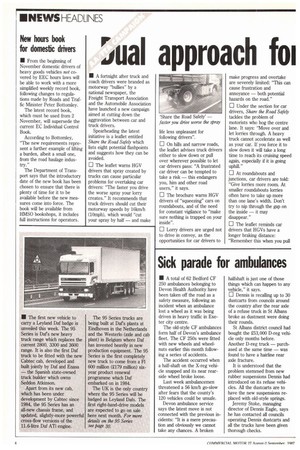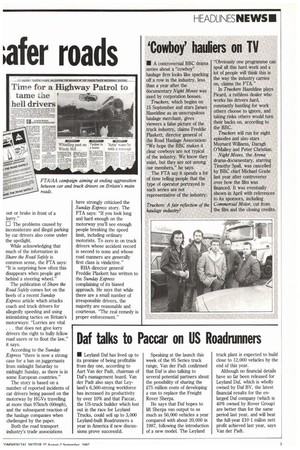'dual approach foi
Page 6

Page 7

If you've noticed an error in this article please click here to report it so we can fix it.
• A fortnight after truck and coach drivers were branded as motorway "bullies" by a national newspaper, the Freight Transport Association and the Automobile Association have launched a new campaign aimed at cutting down the aggravation between car and truck drivers.
Spearheading the latest initiative is a leaflet entitled Share the Road Safely which lists eight potential flashpoints and suggests how they can be avoided.
0 The leaflet warns HGV drivers that spray created by trucks can cause particular problems for overtaking car drivers: "The faster you drive the worse spray your lorry creates." It recommends that truck drivers should cut their motorway speeds by 16Iun/h (10mph), which would "cut your spray by half — and make life less unpleasant for following drivers".
0 On hills and narrow roads, the leaflet advises truck drivers either to slow down or pull over wherever possible to let car drivers pass: "A frustrated car driver can be tempted to take a risk — this endangers you, him and other road users," it says.
0 The brochure warns HGV drivers of "squeezing" cars on roundabouts, and of the need for constant vigilance to "make sure nothing is trapped on your inside".
0 Lorry drivers are urged not to drive in convoy, as the opportunities for car drivers to make progress and overtake are severely limited: "This can cause frustration and annoyance — both potential hazards on the road."
O Under the section for car drivers, Share the Road Safely tackles the problem of motorists who hog the centre lane. It says: "Move over and let lorries through. A heavy truck cannot accelerate as well as your car. If you force it to slow down it will take a long time to reach its cruising speed again, especially if it is going uphill."
O At roundabouts and junctions, car drivers are told: "Give lorries more room. At smaller roundabouts lorries often have to take up more than one lane's width. Don't try to nip through the gap on the inside — it may disappear."
El The leaflet reminds car drivers that HGVs have a longer braking distance: "Remember this when you pull out or brake in front of a lorry."
The problems caused by inconsiderate and illegal parking by car drivers also come under the spotlight.
While acknowledging that much of the information in Share the Road Safely is common sense, the FTA says: "It is surprising how often this disappears when people get behind a steering wheel."
The publication of Share the Road Safely comes hot on the heels of a recent Sunday Express article which attacks coach and truck drivers for allegedly speeding and using intimidating tactics on Britain's motorways: "Lorries are vital . . that does not give lorry drivers the right to bully fellow road users or to flout the law," it says.
According to the Sunday Express "there is now a strong case for a ban on juggernauts from midnight Saturday to midnight Sunday, as there is in some European countries."
The story is based on a number of reported incidents of car drivers being passed on the motorway by HGVs travelling at more than 97km/h (60mph), and the subsequent reaction of the haulage companies when chellenged by the paper.
Both the road transport industry's trade associations have strongly criticised the Sunday Express story. The FTA says: "If you look long and hard enough on the motorway you'll see enough people breaking the speed limit, including ordinary motorists. To zero in on truck drivers whose accident record is second to none and whose road manners are generally first class is vindictive."
RHA director general Freddie Plaskett has written to the Sunday Express complaining of its biased approach. He says that while there are a small number of irresponsible drivers, the majority are reasonable and courteous. "The real remedy is proper enforcement."








































































































